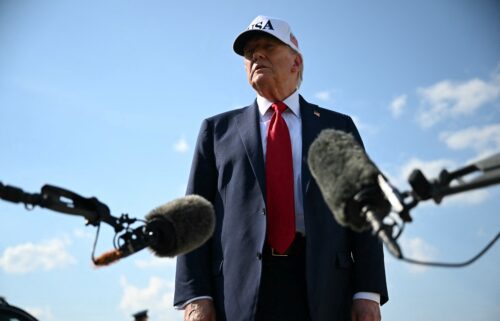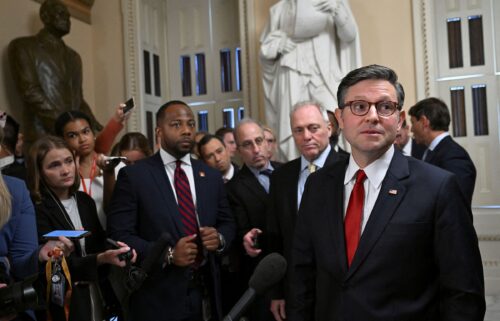Uganda internet shutdown causes polling problems as ex-popstar takes on veteran President
Ugandans headed to the polls on Thursday, following a tense presidential campaign marred by violence and deaths in the lead-up to the election.
There was calm on election day itself, however, with a heavy military presence in Uganda’s capital, Kampala, as long lines of people waited patiently to cast their votes when polls opened at 7 a.m.
Long-standing ruler President Yoweri Museveni, 76, is seeking a sixth term in office and is being challenged by 10 opposition candidates, including the hugely popular singer-turned politician Bobi Wine.
Wine, 38, was spotted among a line of voters in the town of Magere, north of Kampala, earlier on Thursday.
Before casting his ballot, Wine addressed the media and complained that the majority of his polling agents across the country have been prevented from observing the election by police.
Ugandan law guarantees that every candidate is allowed representation at polling locations.
“Everybody was scared, they thought I would not cast my vote,” Wine said in a phone interview with local news station NTV.
“Here I am coming from the polling station. Having survived and overcome and surmounting all these challenges and odds I want to assure Ugandans that we can and indeed will win.”
Many polling stations were forced to use manual voting and checks after the biometric machines failed to register ballots because of the internet shutdown ordered by the government.
“We are getting reports of massive failure of biometric voter identification kits due to internet blockade (over 3,400 polling stations),” the Forum For Democratic Change opposition party wrote on Twitter.
There were also reports of late delivery of voting material and insufficient material at numerous polling locations.
On Tuesday, two days ahead of the polls, internet service providers were ordered to block access to social media platforms. In an address to the nation on the same day, Museveni confirmed that Facebook and other social media were blocked, accusing them of “arrogance.”
Ugandans woke up to news of a total internet shutdown on election day as MTN, one of the country’s largest communication providers, ran radio spots informing listeners of the indefinite suspension by the government.
Wine, who regularly wears a helmet and flak jacket on the campaign trail, is seen as the most prominent challenger, and his message has struck a chord with Uganda’s young people, who have turned out in droves across the country to vote.
World Bank data shows three-quarters of Ugandans are under the age of 30 and have never known another president apart from Museveni.
‘We fear that change will be robbed’
Winnie Nantamu, a 26-year-old mother of three, said she lost her brother in November when security forces killed at least 45 people in protests that rocked Kampala and other parts of Uganda.
The demonstrations were sparked by the arrest of Wine for contravening Covid-19 regulations at a campaign rally. As the news of Wine’s arrest broke, protesters took to the streets of Kampala, clashing with police and military who responded with tear gas.
Nantamu told CNN: “I came out to vote to have change in Uganda, change that is democratic and governed by the constitution.
“I believe change will come this time around, but of course we fear that change will be robbed.”
Abdul Kyeyune said his friends were arrested during a Wine rally, and they are still detained.
“This is what caused me to come and vote. I hope change will come and my friends will be released,” Kyeyune told CNN.
One Museveni supporter, Livingstone Hamara, 63, said: “I worry with so many young voters that it is very unlikely for a sixth term.”
Museveni does not appear eager to let a fair and free democratic election unfold after more than three decades in power.
In 2017, he changed the constitution to remove the age limit to allow him to extend his iron grip on power.
However, he said in a CNN interview that he would “accept the results” if he lost.
“Uganda is not my house… if the people of Uganda don’t want me to help them with their issues, I go and deal with my personal issues very happily,” he told Christiane Amanpour.
Uganda’s Electoral Commission has said it will declare the winner within 48 hours after polls closed at 4 p.m. local time (8 a.m. ET).



